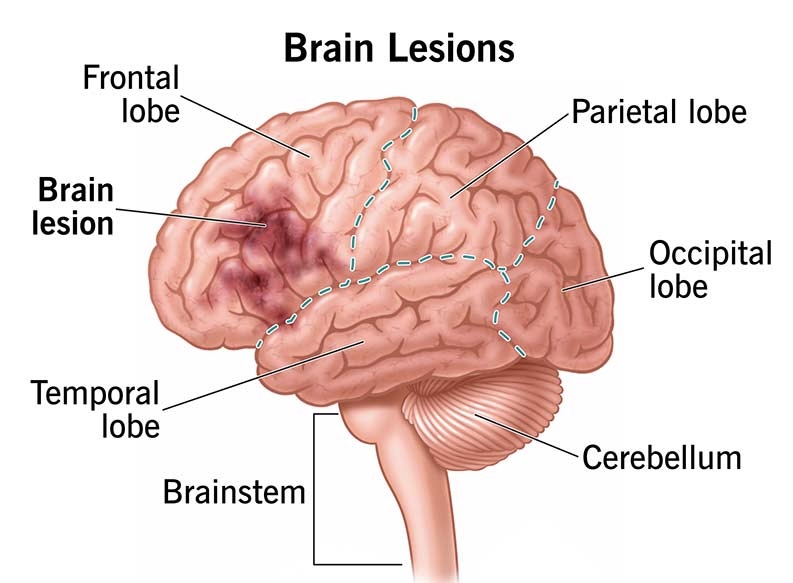Brain Lesions: Symptoms, Causes, Treatments
What are the symptoms of a brain lesion?
Brain lesions can cause a variety of symptoms depending on their size, location, and underlying cause. Some common symptoms of brain lesions may include:
- Headaches: Persistent or severe headaches that may worsen over time can be a symptom of a brain lesion.
- Seizures: Brain lesions can cause abnormal electrical activity in the brain, leading to seizures.
- Cognitive changes: Brain lesions can affect cognitive function, leading to changes in memory, concentration, and thinking ability.
- Motor function changes: Brain lesions can affect motor function, leading to weakness, paralysis, or coordination problems.
- Sensory changes: Brain lesions can cause changes in sensation, such as numbness, tingling, or loss of sensation in certain parts of the body.
- Vision changes: Brain lesions can affect vision, leading to blurred vision, double vision, or vision loss.
- Speech and language difficulties: Brain lesions can affect the areas of the brain responsible for speech and language, leading to difficulties with speaking, understanding, or reading.
- Personality changes: Brain lesions can affect mood and behavior, leading to changes in personality, emotions, or social interactions.
- Nausea and vomiting: Brain lesions can irritate the brain and cause symptoms such as nausea and vomiting.
It’s important to note that these symptoms can also be caused by other conditions, so it’s important to consult with a healthcare provider for an accurate diagnosis and appropriate treatment.
What are the causes of brain lesions?
Brain lesions can have various causes, and the specific cause can often be determined based on the characteristics of the lesion and the patient’s medical history. Some common causes of brain lesions include:
- Traumatic brain injury (TBI): Trauma to the head, such as a blow to the head or a penetrating injury, can cause brain lesions.
- Stroke: A stroke occurs when blood flow to a part of the brain is blocked, leading to tissue damage and the formation of a lesion.
- Infection: Infections such as meningitis, encephalitis, or brain abscess can cause inflammation and lesions in the brain.
- Tumors: Both benign and malignant brain tumors can cause lesions in the brain as they grow and press on surrounding tissues.
- Multiple sclerosis (MS): MS is an autoimmune disease that affects the central nervous system and can cause the formation of lesions in the brain and spinal cord.
- Vascular malformations: Abnormalities in the blood vessels of the brain, such as arteriovenous malformations (AVMs) or aneurysms, can lead to the formation of lesions.
- Hypertensive encephalopathy: Severe high blood pressure can cause brain lesions due to the increased pressure on the blood vessels in the brain.
- Toxic or metabolic disorders: Conditions such as lead poisoning, carbon monoxide poisoning, or metabolic disorders can cause brain lesions.
- Neurodegenerative diseases: Diseases such as Alzheimer’s disease, Parkinson’s disease, or Huntington’s disease can cause brain lesions as they progress.
- Inflammatory conditions: Conditions such as lupus, sarcoidosis, or Behcet’s disease can cause inflammation and lesions in the brain.
It’s important to note that the symptoms and treatment of brain lesions can vary depending on the underlying cause, so it’s important to consult with a healthcare provider for an accurate diagnosis and appropriate treatment.
What is the treatment for brain lesions?
The treatment for brain lesions depends on the underlying cause of the lesion and the specific symptoms it is causing. Some common treatment options for brain lesions may include:
- Observation: In some cases, especially if the lesion is small and not causing symptoms, it may be monitored over time without immediate treatment.
- Medication: Depending on the underlying cause of the lesion, medications such as antibiotics (for infections), corticosteroids (for inflammation), or antiepileptic drugs (for seizures) may be prescribed.
- Surgery: If the lesion is causing significant symptoms or is thought to be a tumor, surgery may be recommended to remove the lesion. Surgery may also be used to drain abscesses or repair blood vessel abnormalities.
- Radiation therapy: Radiation therapy may be used to treat certain types of brain tumors or vascular malformations.
- Chemotherapy: Chemotherapy may be used to treat brain tumors or other cancerous lesions.
- Immunosuppressive therapy: Inflammatory conditions that cause brain lesions may be treated with immunosuppressive medications to reduce inflammation and prevent further damage.
- Symptomatic treatment: In some cases, treatment may focus on managing symptoms such as pain, seizures, or cognitive impairment.
It’s important to note that the treatment approach for brain lesions will vary depending on the specific characteristics of the lesion and the underlying cause. A healthcare provider, typically a neurologist or neurosurgeon, will determine the most appropriate treatment plan based on the individual case.




